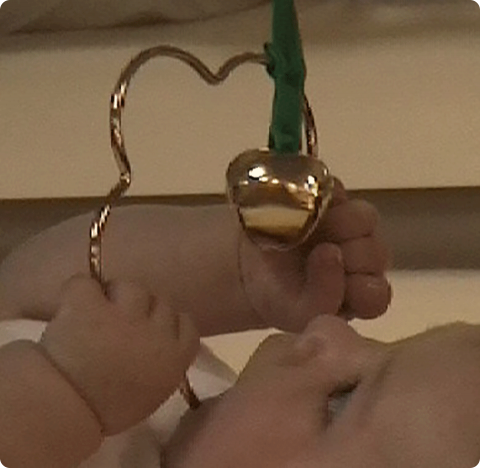Birth to 5 Months
Birth to 5 Months
During the period from birth to 5 months, your baby will be learning how to use their hands, their limbs and their body in a co-ordinated and purposeful way.
Communication
- Your baby is fascinated by the sound of and emotion in your voice and your facial expressions. Your baby will love to hear you talking and singing. You can talk about what you are doing as you do it, when you are changing their nappy. You can talk about your plans for the day, or the things you can see in the room. Your baby enjoys listening to you and watching your mouth move as your speak.
- When your baby watches your mouth move, their mouth will move too. Avoiding the use of a dummy will allow your baby to make these mouth movements and to practice making sounds.
- Keeping background noise down (e.g. the television or music) will mean that your baby can tune into your language.
- It is never too young to read to your baby. Very young babies enjoy colourful picture books with one or two words on each page.
Movement
- Young babies need lots of opportunity for free movement. Your baby will learn how to coordinate their movement and become stronger in their limbs if they have lots of practice time.
- A safe and comfortable space on the floor on a mat will provide your baby with room to move. A large mirror lying sideways alongside the mat will give your baby an opportunity to watch their whole body move. Mirrors are also great for social interaction! It will be a whie until your baby realises that they are the baby in the mirror.
- Young babies seem to prefer lying on their backs, but time on the tummy everyday is important too. If your baby is comfortable on their tummy, you could lie down with them until they are happy in that position.
- Allowing your baby to practice new movements at their own pace will ensure that they build up the necessary muscle strength. Encouraging your baby to sit or stand before they are able to achieve these movements spontaneously could push them before their bodies are strong enough.
- When your baby is moving, have look at their clothing to make sure that it is not in their way. Loose or tight clothing can hold your baby up!
Love
- When your baby feels safe and loved by you and others in their life, this feeds their healthy brain development.
- Feeling loved and accepted supports a baby's healthy emotional and social development.
- You can show your love for your baby by responding when your baby cries, handling their body gently when you change their nappy and making eye contact as often as possible.

